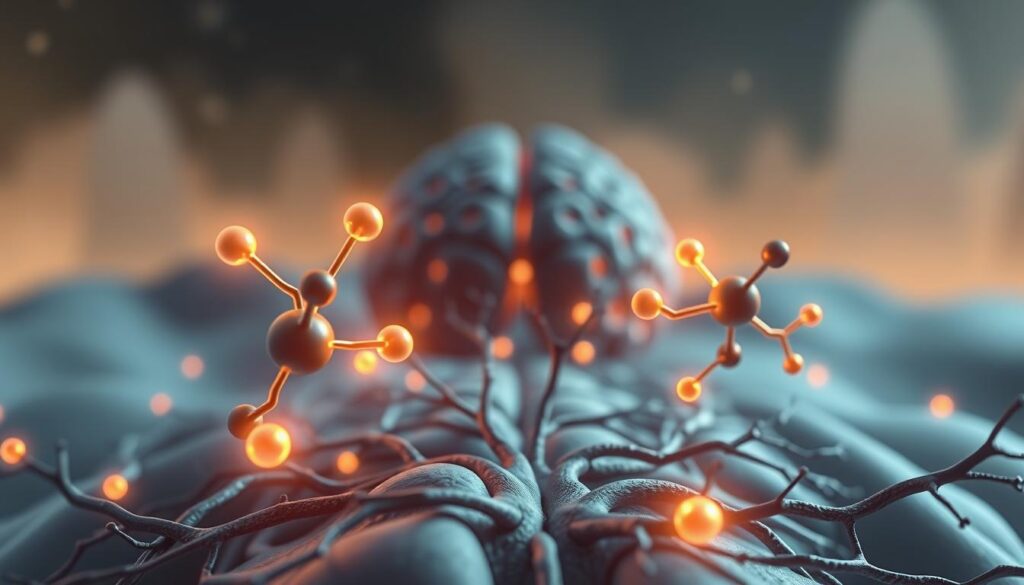Physical Address
304 North Cardinal St.
Dorchester Center, MA 02124
Physical Address
304 North Cardinal St.
Dorchester Center, MA 02124

Have you ever wondered why you’re doing everything right with diet and exercise, but the scale just won’t budge?
I hit this exact wall in my own journey. Despite my best efforts, my progress stalled until I discovered something surprising.
Recent studies show a powerful connection between our rest patterns and body composition. Many Americans struggle with both sleep duration and obesity rates simultaneously.
While science continues exploring the exact mechanisms, the correlation is undeniable. It’s not just about feeling tired – it’s about metabolic health and appetite control.
Two key hormones, ghrelin and leptin, play crucial roles. Their balance gets disrupted when we don’t get enough quality rest.
Understanding this relationship can transform your approach to wellness. Let’s explore how better sleep can become your secret weapon.
No matter how perfectly I followed my diet plan or how hard I pushed at the gym, the numbers on my scale refused to change. I felt stuck and frustrated, wondering what I was doing wrong.
My journey hit a wall despite eating clean and exercising regularly. The scale wouldn’t budge, and I felt constantly tired. This fatigue made workouts feel impossible some days.
I noticed intense cravings for sugary snacks and carbs, especially in the afternoons. My energy levels dipped dramatically around 3 PM daily. This pattern made me question what was happening with my body.
Chronic exhaustion became my normal state. I’d drag myself through days, relying on caffeine to function. The connection between my tiredness and food choices slowly became apparent.
One morning after a particularly restless night, everything clicked. I woke up exhausted and immediately reached for sugary cereal instead of my usual healthy breakfast. The entire day felt like a battle against hunger.
That afternoon, I made poor food choices I normally would avoid. This wasn’t just about willpower – something physiological was happening. I decided to track my sleep patterns to understand what was going on.
The results shocked me. I was consistently getting only 5-6 hours of poor sleep each night. My sleep tracker showed frequent awakenings and very little deep sleep. The data revealed a clear pattern of sleep deprivation.
Initially skeptical, I researched the connection between rest and weight management. The science confirmed what I was experiencing firsthand. This became my turning point in understanding holistic health.
Many people overlook this crucial factor in their weight management journey. Late screen time, work stress, and irregular schedules often disrupt our natural rhythms. Improving sleep quality transformed my approach to wellness.
Sometimes the missing piece isn’t in your diet or exercise routine – it’s in your bedtime routine.
Reflecting on your own sleep habits might reveal similar patterns. That restlessness at night could be affecting more than just your energy levels. Proper rest became my secret weapon against stubborn weight gain.
When I dug deeper into the science behind my stalled progress, I uncovered some eye-opening findings about rest and metabolism. The connection goes far beyond simply feeling tired the next day.
Cutting-edge investigations reveal how our nightly recovery affects everything from food choices to metabolic rate. This understanding transformed my approach to wellness.
Recent work from 2021 shows adults getting less than six hours nightly experience higher weight gain rates. They also report stronger cravings for high-calorie foods.
One particularly compelling investigation caught my attention. Participants who extended their nightly rest by just one hour consumed 270 fewer calories daily. They also experienced natural weight reduction.
Chronic lack of proper recovery alters the brain’s reward system. This makes calorie-dense foods appear more appealing and satisfying. The neurological changes are measurable and significant.
The metabolic price of poor recovery is substantial. It leads to oxidative stress, glucose intolerance, and insulin resistance. These factors directly impact body composition.
Metabolism naturally slows about 15% during proper nightly recovery. Deprivation disrupts this essential process. The body cannot perform its necessary restorative functions.
This creates a challenging cycle. Less energy means reduced activity levels. More waking hours provide additional eating opportunities. Circadian rhythm disruption further complicates the situation.
Modern life presents constant challenges to obtaining sufficient rest. Screen time, work demands, and irregular schedules all contribute. The quality of recovery matters as much as the quantity.
Deep, restorative periods are crucial for metabolic health. Even short-term sleep restriction produces measurable effects. The impact on weight management is both real and significant.
Understanding this connection helped me see why my previous efforts weren’t working. It’s not just about diet and exercise alone. Proper recovery completes the wellness picture.
What I learned about my midnight snack cravings changed everything about my approach to weight management. The biological mechanisms behind appetite regulation became clear once I understood how rest affects our internal signals.
Two key players control our eating patterns: ghrelin and leptin. When we don’t get enough quality rest, these hormones get completely out of balance.

Think of ghrelin as your body’s dinner bell. It signals your brain when it’s time to eat. Under normal conditions, it follows a predictable pattern throughout the day.
When I was consistently short on rest, my ghrelin levels spiked dramatically. Studies show men sleeping only 4 hours have 28% more ghrelin than those getting 10 hours.
This hormone surge creates intense hunger signals that are hard to ignore. It’s not just mental willpower – it’s a powerful physiological drive to eat.
Leptin works as the opposite force to ghrelin. It’s the hormone that tells your brain you’ve had enough food. Proper leptin function helps you feel satisfied after meals.
Sleep deprivation causes leptin levels to drop significantly. With lower leptin, your brain doesn’t receive the “I’m full” message properly.
This combination of high ghrelin and low leptin creates a perfect storm for overeating. You feel hungrier while feeling less satisfied from the same amount of food.
The hormonal imbalance explains part of the story, but there’s more. Poor rest actually changes how your brain perceives food rewards.
Research shows sleep-deprived people strongly prefer high-calorie, carbohydrate-rich foods. The brain’s reward centers become more active when viewing these foods.
I noticed this myself – after rough nights, donuts looked irresistible while salads seemed unappealing. This isn’t character weakness; it’s neuroscience.
The effect is consistent across multiple studies showing clear causal links. Shortchanged rest alters food preferences toward energy-dense options.
The good news? Improving your sleep patterns can rebalance these hormones naturally. Better rest helped my cravings diminish without constant willpower battles.
I discovered something fascinating about how our bodies work overnight. While we rest, our metabolism takes a natural dip that’s actually healthy and normal. This nightly slowdown helps our bodies repair and recharge properly.
When I wasn’t getting enough quality rest, this natural process got completely thrown off. My body couldn’t perform its essential nighttime functions correctly. The metabolic price of poor recovery became painfully clear in my weight management struggles.

Our metabolic rate naturally decreases about 15% during proper rest periods. This dip reaches its lowest point in the early morning hours. The National Library of Medicine confirms this is a normal, healthy process.
This metabolic slowdown allows our bodies to focus energy on repair and restoration. Cells get repaired, memories get consolidated, and hormones get balanced. It’s like putting your body in maintenance mode overnight.
When I cut my rest short, I disrupted this essential cycle. My body couldn’t complete its nightly repair work properly. This created a cascade of metabolic issues that affected my weight management efforts.
Insulin resistance became a real problem during my sleep-deprived periods. My body struggled to process sugar efficiently from foods I ate. This led to more fat storage instead of energy production.
Even small disruptions in my rest patterns reduced insulin sensitivity significantly. My blood sugar levels became harder to manage throughout the day. I felt more sluggish and experienced energy crashes.
The connection between rest duration and glucose processing is well-documented. Poor recovery increases oxidative stress and promotes glucose intolerance. These factors directly contribute to weight management challenges.
Cortisol levels spike when we don’t get enough quality rest. This stress hormone encourages abdominal fat retention specifically. Belly fat from cortisol is particularly stubborn to lose.
Research from Depner et al. (2019) shows elevated cortisol from sleep loss promotes fat accumulation around the midsection. This type of fat storage is linked to higher health risks beyond just appearance concerns.
I noticed my waistline expanding despite no major changes in my diet. The cortisol connection explained why belly fat became my particular struggle area. Reducing stress and improving rest helped reverse this pattern.
| Sleep Factor | Metabolic Impact | Weight Management Effect |
|---|---|---|
| Proper Duration | 15% metabolic slowdown | Healthy repair and maintenance |
| Sleep Restriction | Insulin resistance | Increased fat storage |
| Poor Quality | Elevated cortisol | Belly fat accumulation |
| Disrupted Cycles | Glucose intolerance | Energy crashes and cravings |
Understanding these metabolic connections transformed my approach to weight management. Good rest supports healthy metabolism, making weight loss efforts more effective. The metabolic slowdown during proper recovery is actually your body’s friend, not your enemy.
I remember dragging myself to the gym after another restless night. My usual workout felt like climbing a mountain with lead weights tied to my ankles. That’s when I realized exhaustion wasn’t just mental – it was physical too.
Poor rest drains your physical capacity dramatically. Your body struggles to generate the power needed for movement. Every lift, step, or stretch requires extra effort.
I noticed my heart rate spiked faster during simple activities. My muscles felt heavy and unresponsive. The fatigue made me cut workouts short or skip them entirely.
This creates a frustrating cycle. Less activity leads to poorer rest quality. Then reduced energy makes exercise feel impossible again. Breaking this pattern requires addressing both sides.
Quality rest transforms how your body bounces back from exercise. During deep stages, your muscles repair and rebuild. This process is essential for progress and injury prevention.
Without proper recovery, micro-tears in muscle tissue don’t heal properly. Inflammation increases and performance plateaus. I experienced more soreness and longer recovery times when my rest suffered.
Good habits help your body maximize every workout’s benefits. You wake up refreshed and ready for another session. The improvement in both areas creates powerful synergy.
“Movement and rest are two sides of the same wellness coin – you can’t have one without the other.”
Timing your activity can significantly impact your rest quality. Morning workouts with natural light help regulate your circadian rhythm. This sets your internal clock for better sleep at night.
Afternoon exercise works well for many people too. It helps relieve daily stress and tension. Just avoid intense activity too close to bed time.
Even light movement makes a difference. A brisk walk after dinner helped me sleep more deeply. The key is consistency rather than intensity.
| Activity Time | Sleep Benefit | Recommendation |
|---|---|---|
| Morning | Circadian regulation | Outdoor light exposure |
| Afternoon | Stress reduction | Moderate intensity |
| Evening | Relaxation | Light stretching or walking |
| Anytime | Overall improvement | Consistency matters most |
Finding what works for your schedule is most important. The best time is the one you’ll stick with regularly. Even small amounts of movement create positive changes.
Remember that some activity beats none at all. On tired days, a short walk still benefits your rest. Consistency builds momentum in both exercise and sleep quality.
After understanding the science behind my struggles, I knew I needed actionable strategies. I focused on creating sustainable habits that transformed my rest patterns. These changes became my secret weapon for successful weight management.
Small, consistent adjustments made the biggest difference. I stopped chasing perfection and focused on progress. Each improvement created positive ripple effects throughout my day.
I started setting consistent bed and wake times, even on weekends. This simple habit regulated my body’s internal clock. My metabolism began functioning more predictably.
I use a bedtime alarm just like my morning alarm. This reminder helps me wind down at the same time each night. Consistency proved more important than perfect timing.
Research shows adults maintaining regular schedules experience better weight maintenance. Their bodies learn when to expect rest and activity. This rhythm supports hormonal balance.
I invested in blackout curtains to create complete darkness. Cool room temperature and noise reduction completed the transformation. These changes significantly improved my rest quality.
The National Library of Medicine confirms darkness supports melatonin production. This hormone regulates sleep-wake cycles. Proper environment makes quality rest possible.
My bedroom became a sanctuary dedicated to recovery. Electronics stay outside this space. The mental association helps me relax instantly upon entering.
Evening journaling became my stress management tool. I release daily tensions through writing before bed. Deep breathing exercises and gentle yoga complete my wind-down routine.
I reduce screen time ninety minutes before sleep. This minimizes blue light exposure that disrupts natural rhythms. The improvement in sleep onset was immediate.
These practices help me approach rest with calm intention. Stress management supports both mental peace and physical recovery. The combination proves powerful for overall wellness.
“The best bridge between despair and hope is a good night’s sleep.”
I avoid large meals within three hours of bedtime. This prevents digestive disruption during sleep. Alcohol close to bedtime also gets eliminated from my routine.
Morning workouts with natural light regulate my circadian rhythm. This sets my internal clock for the entire day. The timing supports both energy levels and evening rest.
Research confirms early birds often maintain better weight balance. Their natural rhythms align with daylight patterns. This synchronization supports metabolic health.
| Evening Habit | Change Made | Result Achieved |
|---|---|---|
| Meal Timing | Stop eating 3 hours before bed | Better digestion and rest |
| Screen Use | 90-minute digital curfew | Faster sleep onset |
| Stress Management | Journaling and breathing | Calmer mindset |
| Environment | Dark, cool, quiet bedroom | Deeper sleep cycles |
These practical steps reduced my cravings dramatically. My energy improved for daily activities without constant willpower battles. The changes compound over time, creating lasting transformation.
Remember that consistency beats perfection every time. Start with one change and build from there. Your body will thank you with better rest and easier weight management.
What truly transformed my approach to weight management wasn’t another diet plan, but a fundamental shift in how I viewed nightly recovery. I discovered that proper rest regulates hormones, boosts metabolism, and reduces cravings naturally.
My weight loss plateau finally broke when I made quality rest a non-negotiable priority. The changes sustained my progress in ways no temporary diet ever could.
View sleep as your powerful ally against obesity and appetite struggles. Better rest improves heart health, sharpens thinking, and stabilizes mood too.
Everyone’s journey differs, but quality recovery remains a common success factor. Overcoming sleep deprivation can unlock stubborn resistance.
Start with one small change tonight – perhaps a consistent bedtime or darker room. Your body will thank you with easier weight management and overall wellness.
Assess your habits today and take that first step toward sustainable health. You’ve got this!